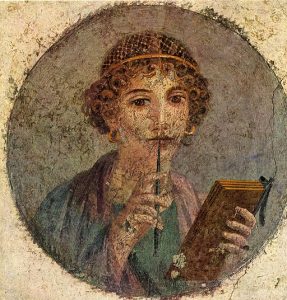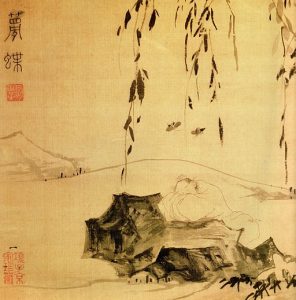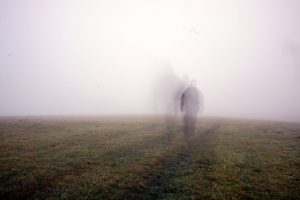you burn me: Sappho In Conversation With Faulkner On Life After Death
The narrative of As I Lay Dying by William Faulkner could not exist without the character Addie Bundren – mother of five and wife to Anse. Throughout the chapters of the novel, the narrative’s perspective changes from character to character as they travel to Jefferson to bury Addie’s body. Addie herself has her own chapter – her voice resounding after death to speak her own monologue.
Convergence of Meaning: The Tripartite Nature of ‘I’ in Paul Auster’s City of Glass
Paul Auster’s City of Glass is a text that confronts a wide array of themes, two of the most prominent being language and identity. Language is presented as the conveyor of meaning, connected to the Biblical myth of Babel, whereas meaning is an evasive concept that is tied to the genesis of language, but ultimately distanced from it by the same connection.
Falling in Love with Siri: Undermining the Male Gaze through the Removal of the Female Body in Her
In her article “Visual Pleasure and Narrative Cinema”, Laura Mulvey aims to bring the oppressive male gaze into question, noting that, “in a world ordered by sexual imbalance, pleasure in looking has been split between active/male and passive/female” (11). Mulvey focuses on mainstream film, arguing that it is a coded language that fuels the active male gaze and passivity of the female.
Midge’s Point of View: Unacknowledged Subversion of the Symbolic in Hitchcock’s Vertigo
Laura Mulvey’s 1975 essay “Visual Pleasure and Narrative Cinema” includes a discussion of Alfred Hitchcock’s 1958 film Vertigo. While the discussion is relatively short, spanning less than a page, it makes important claims about the value of the film in psychoanalytic terms.
Sigmund Tzu and the Dream World
Delving deep into the psyche of Dora, Freud’s case history, Fragments of an Analysis of a Case of Hysteria (Dora), navigates the thoughts and dreams that course through her psyche to find, pick apart, and analyze the potential causes of grief and suffering that plague her daily life.
Eyes to Watch
Eyes are everywhere in the comic series Watchmen by Alan Moore and Dave Gibbons. From the eyes of every character to the pupil-like circles of clocks and “fallout shelter” signs, figures of vision can be found throughout.
The Souls of Black Folk and The Essentiality of Human Connection
Du Bois’ classic text The Souls of Black Folk does not at first read as a cohesive argument. Rather, each chapter offers a different style, a different purpose, and this makes for a complex and at times disjointed reading experience. The unifying factor in the text is the metaphor of the “Veil” – a metaphor which itself varies according to the scope of each chapter.
Anne Frank: The Young Girl and the Writer
When Hitler began his long rise to power in 1919 and promoted anti-Semitism across Europe, the world was devastated by the horror that ensued. Amongst the approximately 60 million people killed during the war, 11 million of them were Jews. Anne Frank’s The Diary of a Young Girl is representative of the fear under Nazi regime and of enduring humanity in times of suffering.
Where the Road Ends
Cormac McCarthy’s The Road explores the bleak and barren post-apocalyptic world of a father and his son and their journey to find sanctuary. As the father and son travel throughout the novel they travel farther and farther down the road. In this new world cannibalism is among the horrors have become normalized, and life in itself has become a tragedy.
The Person in the Picture: The Image and the Self of Esther Greenwood
Throughout The Bell Jar, Esther Greenwood is photographed many times. Sometimes the act of being photographed is equated with the objectification of Esther, which is to say, the photographer takes away Esther’s personhood and she becomes an object in the photograph.









